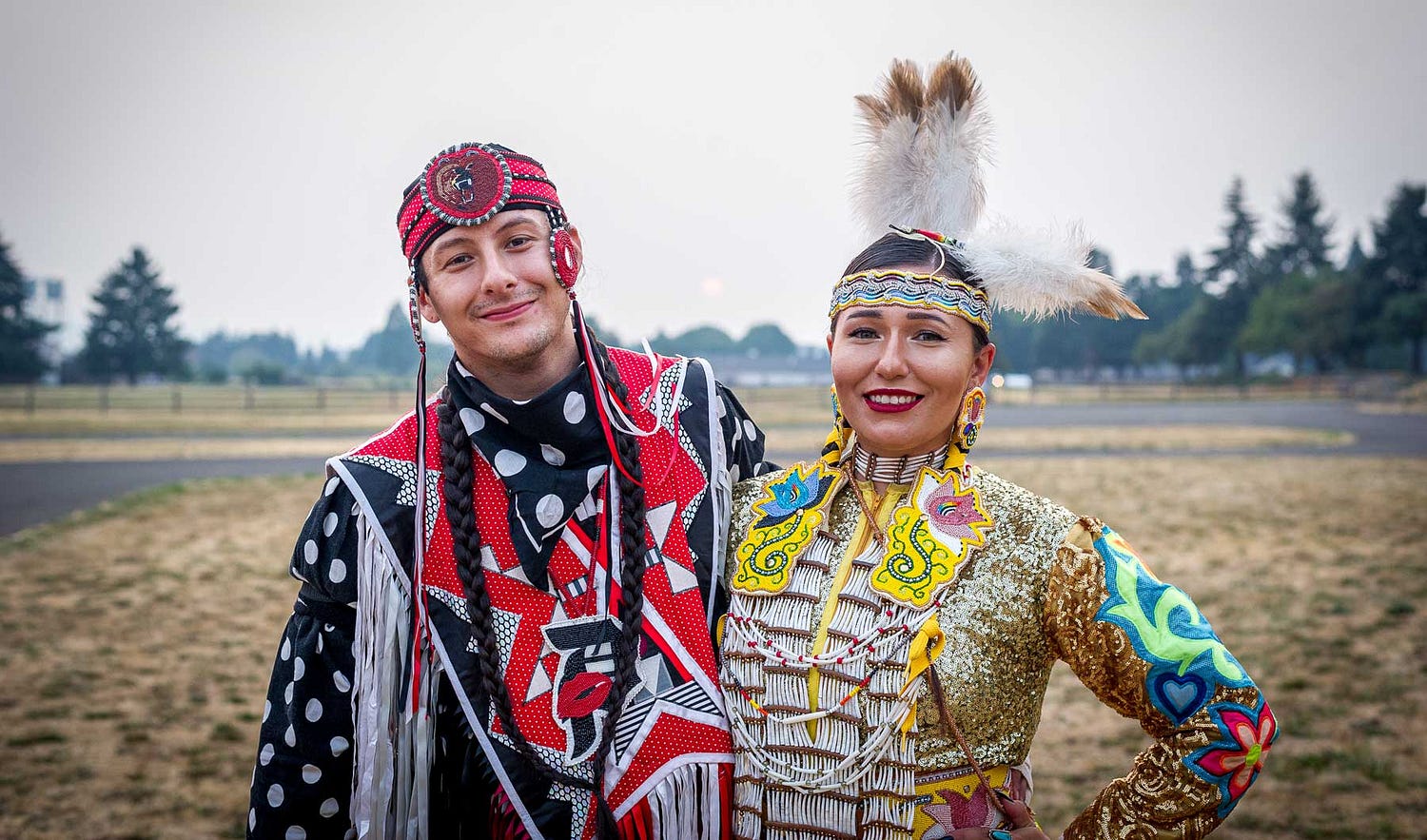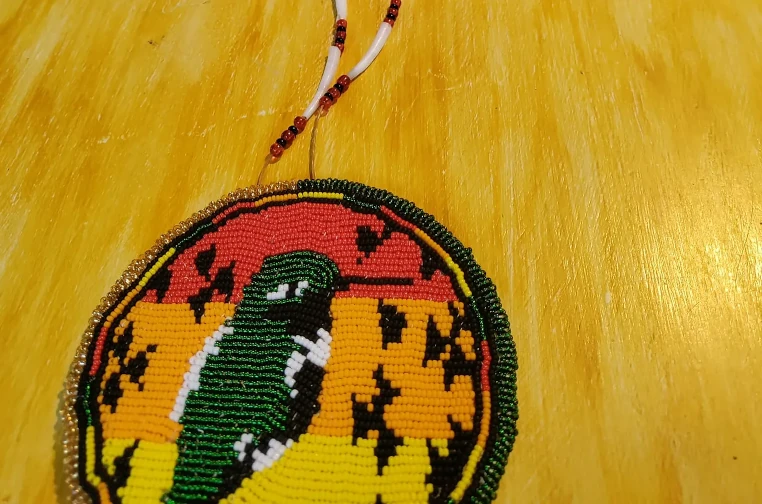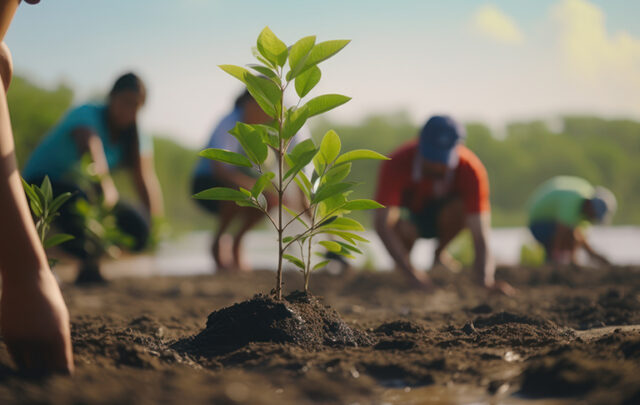In early 2024, the Post Growth Institute ran an Offers and Needs Market (OANM) facilitator training program with predominantly rural Native American families from the Southern Oregon Education School District (SOESD) Indian Education program. This article is inspired by my experience as the lead program designer and facilitator.
For thousands of years, Agnes Pilgrim’s Takelma ancestors hosted a salmon ceremony on the Rogue River. Aggie’s granddaughter, Tanya Nevarez, a participant in the Offers and Needs Market (OANM) facilitator training recalls her grandmother’s explanation of the tradition. Grandma Aggie explained:
My people have a legend that salmon look like us humans and live in beautiful cities below the ocean floor. Every spring and fall they choose to put on the shape of the salmon and come back upriver to feed us. The older ones did the [salmon ceremony] gathering before anybody started fishing, to honor the salmon, and so Creator would bless them and the salmon would come home. They hadn’t done this gathering for a very long time, and in 1993 Spirit told me to bring it back… I felt the presence of the old ones, who guided me.
In 2007, the salmon ceremony of reciprocity, gratitude, and giving back to the Earth was revived.

Agnes Pilgrim in the Story Chair next to Ti’lomikh Falls. Photo by Rory Finney (2012)
This, and many other traditions of Native American tribes, were nearly exterminated through brutal colonization and genocidal acts that intensified the 1800s.
Today, Indigenous culture is sustained and celebrated in Southern Oregon through the leadership of people like Teresa Cisneros and Jasi Swick at the SOESD Indian Education program. They gather a group weekly in both Jackson and Josephine counties, and offer the chance for Native families to practice traditional ways, such as talking circles, stories, dances, crafting and beadwork.
“As an Indian educator, there are two reasons that I am interested in the Offers and Needs Market: Social emotional learning and place-based education,” explained Teresa. “It is a very Indigenous practice, a reminder of how we traded before colonization, which has been distorted. The OANM is reviving this with a modern way of sharing our variety of gifts and meeting our needs.”
The Offers and Needs Market is one of the Post Growth Institute’s key programs in which we draw forth people’s kindness and generosity through markets that go beyond ordinary commerce and value the full range of human interests, skills, and aspirations. The OANM stimulates contemplation of the endless variety of potential exchanges such as passions, resources, knowledge, and opportunities — while placing reciprocity at the center of our efforts.
Participants of this cohort shared numerous gifts — from advice on beadwork and help sewing regalia to homemade cinnamon rolls and recipes for the salmon chowder that we ate together. There was a spirit of generosity as we cared for each other. “My religion is reciprocity with Life!” said Jasi, a value clearly demonstrated in her work and service in the rural Illinois Valley and beyond.
Native traditions of community care go beyond practicality — they are rituals of belonging. In the interconnected web of “all my relations,” individuals find not just sustenance but a profound sense of being part of something greater than themselves. As Keeli Littleleaf explained, “Traditional Indigenous wealth wasn’t based on how much we have, but how much we give away.”
From an Indigenous perspective, community care is woven into the very fabric of life. Each member of the community is seen, heard, and valued. Through each season in life we have unique needs, knowledge, and abilities. Native harvests often require skills and knowledge (of place and process) which are passed down generationally. Ashley, a participant from the Yurok Tribe, said:
Huckleberry jam is made sweet with all the time and care in it. When mussels were harvested by Yurok Native Americans on the California coast, they’d be distributed upriver via canoes as a gift for the elders there, who were delighted to receive a share of the harvest. We would weave our baskets for gathering from hazel wood, which would grow straight because of the fire management. Then we had to know the safe timing to go get the mussels. There were so many mussels, yet we never took all of them. That is very important, to leave some anytime we harvest something, so that life continues.

Yurok women
The OANM also resonated with Keeli Littleleaf, who is Warmsprings, Wasco, and Wyam of the Columbia River territories, as well as Pikanii Blackfeet. “When I’m at a powwow and see these variations, like the way the regalia is worn or the melody of a song, there’s such beauty in the many ways of different tribes,” she said. “During this OANM training, I saw the diversity of offers and needs within myself and in our Indigenous community.” Keeli is champion jingle dress dancer, and teaches a variety of traditional practices, beading, sewing, harvesting, and dancing. She is Oregon’s Miss Sweetheart 2023, and on July 17th & 18th she is organizing a Pacific Northwest Tribal Fashion Show to showcase Indigenous brilliance in Grand Ronde, Oregon.

Keeli Littleleaf with her partner Jared Jackson in Portland, Oregon (2022)
Acknowledging this respect for diversity, another participant said, “This is my first time with an Indigenous solidarity group, it was very moving how there were no judgements, our tribal differences were celebrated.”
Making art and gifting it is a kindness beyond measure. One participant was inspired to bead his first medallion (a hummingbird), another made a ribbon shirt for a participant from the Cow Creek tribe, while another was able to make a start on organizational legal documents for a mentoring nonprofit. Another reflected on the multitude of ways to get involved, uplift one another, and to share knowledge and amplify prayers. “I realized how surface level most of our relationships are, even with those I see frequently,” she said. “I don’t know their needs.” Sometimes asking what people need is an act of kindness that evokes tears: we care, we matter, we are seen.

Hummingbird medallion created during the OANM
Through rituals such as the salmon ceremony and Potlatch, the social tapestry is replenished, as communities cultivate feelings of intergenerational belonging. Among the oak and madrone trees on the banks of the Rogue River in Oregon, ancestral lands of the Shasta, Takelma, and Latgawa peoples, we were reminded that this Earth is only borrowed from our ancestors.
This training was funded by the Oregon Community Foundation. Additional support and donations were generously provided by Rogue Food Unites, the Medford Food Co-op, Restoration Seeds, Nourish Indigenous Kitchen, and Siskiyou Seeds.
Inspired by this article? Here are some things you can do next:
- Sign up for the next round of Offers and Needs Market facilitator training.
- Browse our Bookshop for a list of titles related to Indigenous mutual aid.
- Join the Fall 2024 public conversation series, Catalyzing Mutual Aid in Southern Oregon: Weaving Indigenous Wisdom and Ancestral Community Care Practices with Modern Solidarity Economy Perspectives. Sign up to the OANM mailing list to be the first to find out more.





